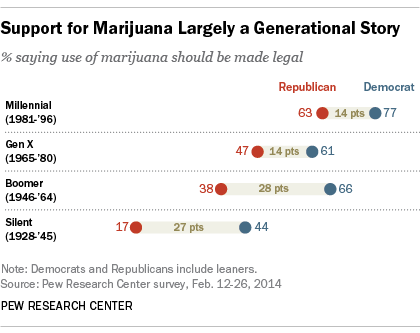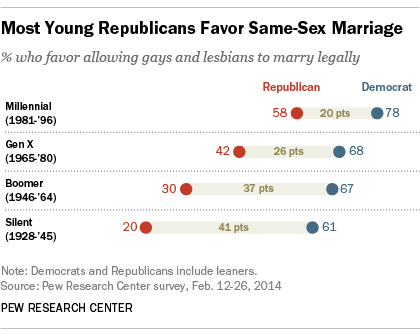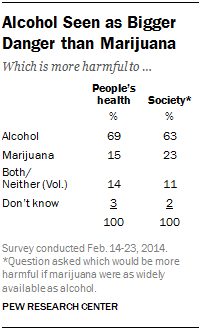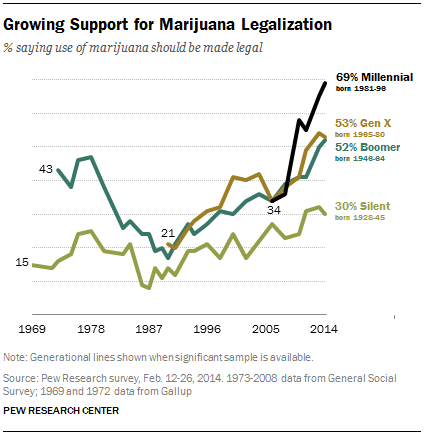Support for legalizing marijuana has rapidly outpaced opposition, with a slim majority (52%) favoring its legal use as of October 2014. That trend is driven largely by the Millennial generation, who support marijuana at much higher rates than their elders.
 But when looking more closely at the opinions of young and old, the age gap is starkest among Republicans and those who lean Republican – a strikingly similar trend to what we’ve seen within the party when it comes to same-sex marriage.
But when looking more closely at the opinions of young and old, the age gap is starkest among Republicans and those who lean Republican – a strikingly similar trend to what we’ve seen within the party when it comes to same-sex marriage.
Six-in-ten (63%) GOP Millennials say the use of marijuana should be made legal, while 35% say it should be illegal, according to our February 2014 survey. That level of support is higher than among Republican Generation Xers (47%) and Baby Boomers (38%), and much higher than among GOP members of the Silent generation (17%). (When we asked the question again in October, overall opinion was only slightly changed.)
 Republican Millennials, however, are not as supportive of marijuana legalization as their young Democratic and Democratic-leaning counterparts. Democrats overall are more enthusiastic supporters, with three-in-four (77%) Democratic Millennials favoring legal marijuana use, as well as 66% of Boomers, 61% of Gen Xers and 44% of the Silent generation inside the party. Across every generational divide, Democrats show higher support than Republicans on this issue.
Republican Millennials, however, are not as supportive of marijuana legalization as their young Democratic and Democratic-leaning counterparts. Democrats overall are more enthusiastic supporters, with three-in-four (77%) Democratic Millennials favoring legal marijuana use, as well as 66% of Boomers, 61% of Gen Xers and 44% of the Silent generation inside the party. Across every generational divide, Democrats show higher support than Republicans on this issue.
The overall sea change in marijuana views comes as Oregon, Alaska and the District of Columbia passed ballot measures legalizing marijuana use in the 2014 election, with the latter two officially going into effect this week. (Colorado and Washington are the only other states that have instituted laws to legalize marijuana.)
But legalization in the nation’s capital drew heated criticism from congressional Republicans, who called for investigations and hearings against the city. It also came up at this week’s annual Conservative Political Action Conference on Thursday, the day the D.C. voter initiative went into effect, with a panel debate between 2014 libertarian presidential candidate Gary Johnson and former Republican Rep. Ann Marie Buerkle of New York.
 The debate over marijuana also comes ahead of the 2016 presidential election, when both political parties are fighting over the coveted Millennial vote as this group of eligible voters swells in size, even if its members do not consistently show up on Election Day.
The debate over marijuana also comes ahead of the 2016 presidential election, when both political parties are fighting over the coveted Millennial vote as this group of eligible voters swells in size, even if its members do not consistently show up on Election Day.
It’s not as though Americans are unconcerned about the drug. Most Americans (54%) say legalization would lead to more underage use, according to a separate survey conducted in February 2014. But Americans overall also view marijuana as less harmful than alcohol, both to personal health and to society more generally. And most Americans (76%) think that people convicted of possessing small amounts of marijuana should not have to serve time in jail, with large majorities of both Republicans and Democrats agreeing on the issue.
 Another interesting historical trend is how opinions have evolved across generational groups. Namely, Baby Boomers’ support for marijuana legalization peaked in the late 1970s, before plummeting in the 1980s during the nation’s “War on Drugs” era. But today, Boomers’ support for legalizing marijuana is greater than it was four decades ago. Even within the last decade, Millennials have shifted. In 2006, just 34% of Millennials favored the legal use of marijuana; by 2014, that share had risen to 69%.
Another interesting historical trend is how opinions have evolved across generational groups. Namely, Baby Boomers’ support for marijuana legalization peaked in the late 1970s, before plummeting in the 1980s during the nation’s “War on Drugs” era. But today, Boomers’ support for legalizing marijuana is greater than it was four decades ago. Even within the last decade, Millennials have shifted. In 2006, just 34% of Millennials favored the legal use of marijuana; by 2014, that share had risen to 69%.


